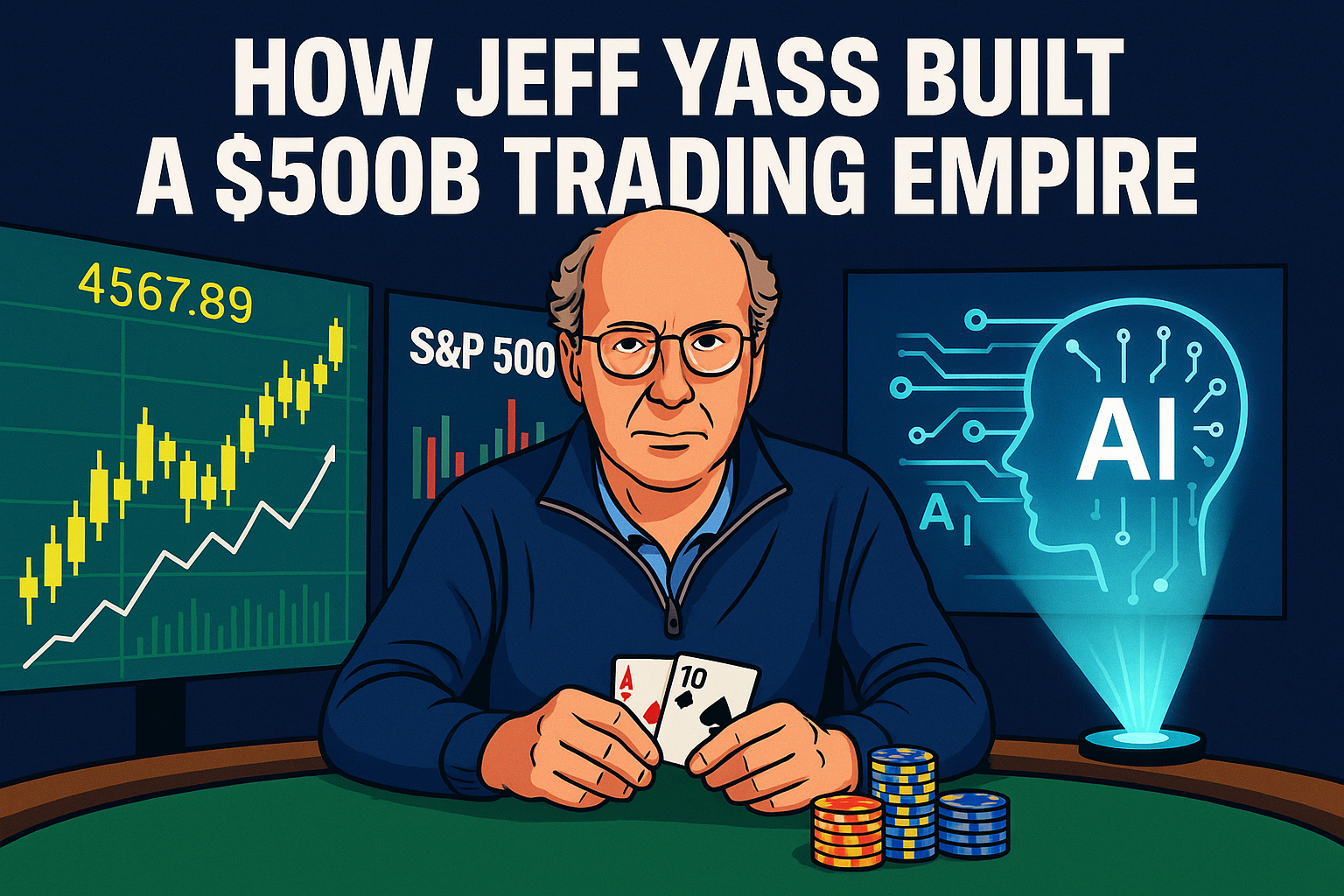Your basket is currently empty!
Jeff Yass is one of the most quietly powerful figures in modern finance.
While his name rarely appears on CNBC or Bloomberg panels, his company, Susquehanna International Group (SIG), trades hundreds of billions of dollars across global markets every day.
What makes Yass’s story extraordinary is that his empire wasn’t built from Wall Street tradition. It was built from poker tables, probability theory, and a calm understanding of human behavior.
At its core, Jeff Yass’s success proves that financial markets and poker share the same DNA: discipline, patience, and asymmetric thinking. To him, the market isn’t a place to gamble. It is a game of incomplete information where skill, mathematics, and risk control separate survivors from speculators.
The Early Years: Poker as a Training Ground for Traders

Long before Yass founded one of the most profitable trading firms in history, he was making a living playing poker in Las Vegas and underground clubs across New York.
He didn’t play for entertainment. He played to understand probability, human bias, and how emotion destroys logic.
Poker taught him to think in terms of expected value, not single outcomes. Each hand, like each trade, was a small experiment in probability. Winning was never about luck. It was about making the best possible decision based on odds, position, and risk.
This framework shaped his mindset permanently. When Yass looked at financial markets, he saw the same principles: position sizing, variance, bankroll management, and pattern recognition. Poker was the perfect apprenticeship for trading.
From the Poker Table to a $500B Trading Empire
In 1987, Yass and a handful of fellow poker players founded Susquehanna International Group in Bala Cynwyd, Pennsylvania.
Their goal was to apply the logic of poker to options trading. Every decision would be governed by probability and statistics.
While Wall Street traders relied on instinct, Yass’s team relied on math.
SIG became one of the first firms to integrate game theory into financial modeling. Instead of asking “Will the market go up or down?” they asked, “What is the probability of each outcome, and what is the expected value of every decision?”
Within a decade, SIG grew into a global powerhouse. By focusing on liquidity provision, derivatives trading, and market-making, Yass built an engine that profited from inefficiencies in pricing rather than predictions.
Today, SIG manages over $500 billion in market exposure and continues to train its traders using poker simulations to sharpen decision-making under pressure.
Five Poker Lessons That Built a Financial Empire
Jeff Yass’s philosophy can be distilled into five poker lessons that every trader should understand.
These are not motivational slogans. They are the core mechanics that built his trading empire.
1. Know Your Edge
Every great poker player knows who they profit from. Every great trader knows exactly where their market advantage comes from.
Yass trains his traders to identify the precise source of their edge whether it’s speed, data analysis, pricing efficiency, or risk modeling.
If you can’t define your edge, you don’t have one.
And if you can’t spot who’s losing money in a market, it might be you.
Trader takeaway: Backtest your strategy until you can quantify your edge. Track expectancy, win rate, and risk-reward. A consistent edge turns randomness into probability.

2. Bet Big When the Edge Appears
Card counters in blackjack only increase their bets when the count is in their favour. Yass follows the same principle in trading.
When the probabilities tilt toward success, traders are encouraged to size up intelligently.
This doesn’t mean taking reckless risks. It means pressing your advantage when the data aligns.
Trader takeaway: Identify high-probability setups and allocate more capital only when conditions validate your edge. Learn to be patient most of the time and decisive at the right time.
3. Focus on Process, Not Results
Yass constantly reminds traders that there is a difference between a good decision and a good outcome.
Even perfect trades can lose money, just as bad players can sometimes win a poker hand. The goal is to make decisions that are correct over time, not in isolation.
He trains traders to get comfortable with variance. The only metric that matters is whether the process is sound and repeatable.
Trader takeaway: Journal your trades. Analyze whether your entries, exits, and risk controls followed plan. Judge yourself on process quality, not profit or loss on a single trade.
4. Position Sizing Is Everything
Even pocket aces can lose. No single trade, no matter how good it looks, should ever threaten your survival.
Yass teaches strict capital preservation. The first rule of poker is to stay in the game long enough for your edge to play out. The same applies to trading.
At SIG, traders are taught to treat position sizing mathematically. Every trade carries a defined fraction of total risk. Losses are expected and managed long before they occur.
Trader takeaway: Never risk more than 1 to 2 percent of your account on a single trade. Build your system around survivability.
5. Master Emotional Variance
In poker, emotion kills logic. In trading, it destroys accounts.
Yass built his training programs around emotional control because he knows most traders lose not from bad systems, but from breaking their own rules under stress.
Traders at SIG simulate high-pressure scenarios to practice making calm decisions under volatility. This is how they stay consistent in chaos.
Trader takeaway: Build psychological rituals. Step away after losses. Avoid impulsive trades. The trader who can manage emotion will always outperform the one chasing dopamine.
Beyond Trading: How Yass Built a Global Financial Network
Jeff Yass’s empire extends far beyond the trading floor. His businesses now operate across private equity, venture capital, structured finance, and technology investment.
Each arm of his network follows the same probabilistic logic he learned from poker.
Susquehanna Growth Equity (SGE)
SGE focuses on scalable, data-driven businesses. Instead of spraying capital across hundreds of startups, Yass invests only in firms that already demonstrate strong recurring revenue and growth metrics.
Portfolio companies include Credit Karma, Payoneer, Zego, and iCIMS all leaders in fintech and enterprise software.
SIG Asia and the ByteDance Bet
Through SIG Asia, Yass made one of the greatest early-stage investments in history a stake in ByteDance, the parent company of TikTok.
He recognized the potential of AI-driven content recommendation before it became mainstream. That single move turned a few million dollars into tens of billions.
Susquehanna Structured Capital
This division focuses on lending, real estate, and asset-backed financing. It provides stability against the volatility of trading and venture markets.
While others chase short-term returns, Yass uses structured finance to balance his risk portfolio.
Political and Ideological Influence
Yass is also a significant donor to libertarian and free-market causes. He funds think tanks like the Cato Institute and Club for Growth, shaping policy toward market freedom and innovation.
Even here, his strategy is consistent invest in systems that reinforce his worldview.
Lessons Traders Can Apply Today
Jeff Yass’s entire career can be summarized by a few principles that apply to any trader or investor.
Think in probabilities, not certainties. The market is a game of incomplete information. Play only when the odds favor you. Most opportunities aren’t worth taking. Wait for high-quality setups. Protect your capital. Longevity is the foundation of compounding. Detach from emotion. Focus on correct decisions, not perfect outcomes. Diversify intelligently. Balance growth, stability, and liquidity across your portfolio.
The same mindset that wins poker tournaments can build billion-dollar portfolios. Success in both comes from discipline, risk control, and an obsession with process over prediction.
Further Reading
Bloomberg: Inside Susquehanna International Group Financial Times: How Quant Firms Reshaped Wall Street Forbes: Jeff Yass Profile and Investment Strategy Investopedia: Position Sizing and Risk Management
Extra Reading
The Zero Property in Trading: Why Even Skilled Traders Fail The Billionaire Divorce, Nintendo’s $100B Empire, and Why Stablecoins Terrify Banks


0 responses to “The Poker Trader: How Jeff Yass Built a $500B Empire from Game Theory and Patience”